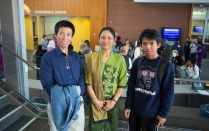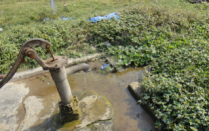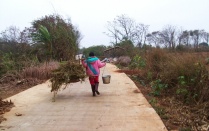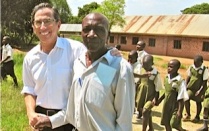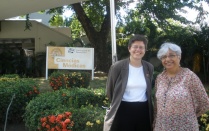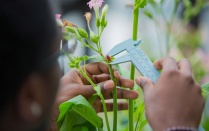UB among Top 25 in U.S. for environmental, social impact

UB's North Campus. Photo: Douglas Levere
Release Date: December 10, 2024
BUFFALO, N.Y. – The University at Buffalo is being recognized as one of the top universities in the world, and a Top 25 university in the U.S., for environmental and social impact. That’s according to the 2025 edition of the QS World University Rankings: Sustainability, released today by higher education analyst QS Quacquarelli Symonds.
UB comes in at No. 21 in the U.S. and 137th globally, an improvement of six spots from last year. The 2025 rankings feature 1,744 universities across 107 countries and territories, including 239 U.S. institutions.
QS’ methodology is based on performance across three broad assessment categories: environmental impact, social impact and governance. Among U.S. colleges and universities, UB is 20th in environmental impact, 51st in social impact, and 21st in governance.
Within the lens of environmental impact, UB is ranked 13th in the U.S. . based on the wide-ranging social impact of its sustainability operations, environmental research and environmental education.
UB is a national leader in sustainability operations, due in large part to the university’s climate action plan, known as the 10 in 10, a roadmap of innovative, engaging and digestible steps the university is taking to increase climate action across the university. In addition, UB last year embarked on a decarbonization plan for the South Campus, and is now doing the same on the much larger North Campus.
Moreover, researchers across UB are conducting impactful environmental and sustainability research, including:
- Engineers who are developing new membrane technology that could greatly reduce the amount of energy needed to produce pharmaceuticals, chemicals, food and other products.
- A geography professor who’s shining a light on the link between pollutants and emergency room visits in historically redlined neighborhoods,
- And a chemist who investigates contaminants in the environment, including per- and polyfluoroalkyl substances (PFAS), a group of synthetic compounds that have been widely used in consumer products for decades and take so long to break down in the environment that they’re known as “forever chemicals.”
At UB, students have the opportunity to study a broad range of environmental academic programs at the bachelor’s, master’s and doctoral levels. These include environmental studies; environmental sustainability; sustainability leadership; evolution, ecology and behavior; environmental engineering; biological sciences; geology; environmental design; environmental health sciences; and sustainable operations.
UB’s social impact score takes into account research UB faculty conduct in developed and developing regions to share knowledge and spur educational growth. It also measures the university’s positive impact in the local community and wider society, such as helping to train residents in underserved neighborhoods for careers in Buffalo’s green jobs sector, and harnessing the power of artificial intelligence to transform early literacy instruction for culturally and linguistically diverse learners.
Environmental and social impact are among the key factors prospective students consider when deciding on a college to attend. QS’ 2024 International Student Survey found that 62% of prospective students consider sustainability practices very important, and 40% actively seek this information when choosing colleges and universities.
“This shift highlights how students increasingly evaluate social and environmental impact alongside academic excellence,” says QS CEO Jessica Turner.
Governance measures whether an institution has open decision-making, student representation on university governing bodies, and financial transparency. UB is No. 21 among U.S. colleges and universities in this category.
Media Contact Information
David J. Hill
Director of Media Relations
Public Health, Architecture, Urban and Regional Planning, Sustainability
Tel: 716-645-4651
davidhil@buffalo.edu
We want to hear about what you are doing in the field of global health. UB faculty, staff, and students, please send us articles highlighting your work!


